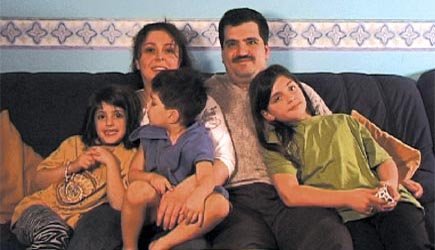Alman Mali
dal 19/4/2007 al 19/5/2007
Segnalato da
Nevin Aladag
Kultug Ataman
Aysun Bademsoy
Ayzit Bostan
Yusuf Etiman/Basso
Ozlem Gunyol
Mustafa Kunt
19/4/2007
Alman Mali
Kunstverein Munchen, Munich
Group exhibition. The progressive disjoining of questions of artistic identity from questions of the national origin of the artistic subjects, allows that intercultural dynamics and hybrid identities are only discussed within a mercantile vocabulary of the conditions of production imbedded within the parameters of regional city marketing.

Group show
'Made in Germany' is a quality seal referring on many products
from Germany to their place of origin. Already before WWI, 'Made
in Germany' or only Germany was used on many products with the
brand name of the manufacturer, for example on porcelain, cutlery,
and equipment of war. When at the end of the 19th Century other
European countries besides Great Britain emerged as economically
successful industrial nations, the United Kingdom began to protect
itself from imported low quality replicas by marking their place
of origin. At first, only German products were effected by this
and where branded 'Made in Germany' (Merchandise Act 1887). The
branding of German products also continued to be used after the
war. But as the quality of imported German products was usually
good, often even better than the national products, 'Made in
Germany' - initially used against German imports - turned into a
seal of quality. (Wikipedia, Stand: 1 April 2007)
With the exhibition ALMAN MALI (Turkish for 'Made in Germany')
Kunstverein München presents contemporary art from Germany. This
very spontaneously planned group exhibition positions itself as an
immediate reaction to an exhibition planned by Sprengel Museum,
Kunstverein und Kestnergesellschaft in Hanover opening in May 2007
and entitled >Made in Germany<. As the press release states, the
title >Made in Germany< has to be understood >>as programmatic in
so far as the exhibition links the question of artistic identity
not solely to place of birth and biography, but negotiates it in
relation to the place of production of the works.
This seemingly progressive disjoining of questions of artistic
identity from questions of the national origin of the artistic
subjects, however, allows once more that intercultural dynamics
and hybrid identities are only discussed within a mercantile
vocabulary of the conditions of production imbedded within the
parameters of regional city marketing. Would be funny if the
international art audience migrating between Münster and Kassel
this summer couldn’t be motivated to make a stopover in Hanover in
order to convince themselves of Germany as a multicultural melting
pot and place of advanced art production.
'Made in Germany' employs cultural hybridity as a marketing tool;
cultural hybridity however is also a central ideologue and
political precondition of regional competitiveness in an global
economy; an economy that seemingly postulates freedom on all
levels, while reducing it’s negative side effects to the level of
individual responsibility, not acknowledging that those are
actually inherent. ALMAN MALI responds with an ironic and yet
concentrated focus on only one of many forms of intercultural
identity in Germany. The participating artists can not only be
characterised by negotiating their identities between a German and
a Turkish background, but more so the process of intercultural
identity construction is one (among many other) aspect of their
work itself. Cultural hybridity is here more than just a PR-
strategy or economical ideology: as it is the horizon within which
the individual, between cultural, political and economical
conditions and individual experience builds and renegotiates
identities.
While consciously focusing only on one small aspect, of what we
acknowledge is a complex discourse, ALMAN MALI opposes the shift
from a culturally, socially and politically defined discourse of
identity, towards the universal language of a global market as
suggested by 'Made in Germany'.In the meantime, we wish our
colleagues in Hanover all the best in taking stock and compiling
>balance sheets< in their attempt to give a comprehensive overview
of art 'Made in Germany'.
Opening april 20, 2007
Kunstverein Munchen
Galeriestrasse 4 - Munchen
Tuesday to Friday: 12 am - 7 pm; sat and sun: 11 am - 6 pm
Admission: 5 euro, reduced 3 euro



